|
|
|
Sort Order |
|
|
|
Items / Page
|
|
|
|
|
|
|
| Srl | Item |
| 1 |
ID:
109185


|
|
|
|
|
| Publication |
2011.
|
| Summary/Abstract |
Rome's approach to the Libyan unrest has been guided by two objectives: to protect the commercial relationship that it has built up with Libya over the past decade, and to prevent a mass exodus of migrants toward Italy. Initially, it was believed that these objectives would be endangered by the intervention advocated by Great Britain and France. By early April, principally because Washington's support for the military mission became clearer, the government's policy changed. Italy secured commitments from the rebel leaders to honour existing agreements and to scale future relations to the level of support they receive. Although Rome's concern about immigration proved to be exaggerated, it was also addressed in late April when France agreed to support a proposed reform of Schengen. Once it concluded that the Qadhafi regime was unlikely to survive, Italy cast aside its earlier caution and joined the NATO-led war.
|
|
|
|
|
|
|
|
|
|
|
|
|
|
|
|
| 2 |
ID:
109188
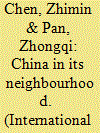

|
|
|
|
|
| Publication |
2011.
|
| Summary/Abstract |
China's regional policy is mainly centred on its efforts to forge a friendly, stable and prosperous neighbourhood. To achieve this end, China has developed an approach combining both partnership bilateralism and tailored regional multilateralism. By and large, China does not consider its neighbourhood as a whole and has been very cautious and hesitant to engage in overarching 'region-building'. China has relied mostly on soft (attractive) use of power, particularly economic power, supported by cultural and assurance diplomacy, even though diplomatic and economic coercion have been exercised occasionally. China has once again become the biggest economy in Asia. Yet, neither the new power configuration in Asia nor China's own ambitions point to a return to the old 'Middle Kingdom' with China holding a dominant position in its neighbourhood. China will most probably continue to see itself as a self-restrained regional power in the foreseeable future.
|
|
|
|
|
|
|
|
|
|
|
|
|
|
|
|
| 3 |
ID:
109184
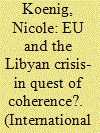

|
|
|
|
|
| Publication |
2011.
|
| Summary/Abstract |
The EU's reaction is slow; the EU is divided; the EU is unable to deliver: time and time again, newspapers depict the image of an incoherent and uncoordinated EU foreign policy. This time, the topic under discussion was the EU's response to the Libyan crisis. Many have compared the EU's internal divisions over Libya with those over the Iraq war, an often used example to illustrate the limits of the Common Foreign and Security Policy (CFSP). This article aims to assess the coherence of the EU's short- to medium-term response to the Libyan crisis. It distinguishes between the horizontal, inter-institutional, vertical and multilateral dimensions of EU coherence. The analysis shows that unilateral actions or inactions of the member states mainly account for the EU's incoherent response. The post-Lisbon institutional structure has done little to compensate for these internal divisions. While the EU cannot change the course of national foreign policies, it should increase its 'leadership for coherence', Europeanise its crisis response in the medium term and aim at preventing incoherence in the longer term.
|
|
|
|
|
|
|
|
|
|
|
|
|
|
|
|
| 4 |
ID:
109189
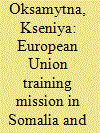

|
|
|
|
|
| Publication |
2011.
|
| Summary/Abstract |
The European Union Training Mission (EUTM) in Somalia, the EU's mission to contribute to the training of the Somali Security Forces, was deployed in April 2010 and extended for another 12-month period in July 2011. Despite the positive assessment of the outcome of the first training period, the overall feebleness of Somalia's Transitional Federal Government puts the political feasibility of the mission into question. EUTM Somalia can be subjected to many of the same criticisms as the liberal peacebuilding agenda in general for trying to contain rather than resolve conflict and maintaining a top-down perspective which ignores organic, indigenous local structures.
|
|
|
|
|
|
|
|
|
|
|
|
|
|
|
|
| 5 |
ID:
109182
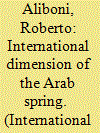

|
|
|
|
|
| Publication |
2011.
|
| Summary/Abstract |
The Arab spring is a transition away from the long alliance between the West and the moderate Arab states, as well as a transition on the part of these states from being more or less passive clients of the US and the West to more or less vibrant democracies with an assertive agenda in the region. As elections take place, they will generate more democratically and Islamist-based governments, certainly more sensitive than previous ones to nationalist feelings and with foreign policy objectives more or less diverging from Western ones. This compels Western countries to revisit and possibly adjust foreign strategies and policies. In this perspective, American and European policy towards the Israeli--Palestinian conflict in recent years may remain a stumbling block in the West's relations with the Middle East and may make the ongoing process of political change in the region more difficult and uncertain.
|
|
|
|
|
|
|
|
|
|
|
|
|
|
|
|
| 6 |
ID:
109186


|
|
|
|
|
| Publication |
2011.
|
| Summary/Abstract |
The EU's self-definition as an integrating civilian, democratic and legal space of political norms and economic regulation, without any significant military power structure, profoundly affects the conception of its neighbourhood policies. It tries to promote with its neighbours what it has achieved itself at home. While the EU has one explicit neighbourhood policy, there are no less than 13 concentric circles of graduated neighbourhood relationships surrounding its territory, with a continuous blurring of categories between them. The EU can be described as engaging in a policy of Eurocentric normativism. But does trying to make neighbours 'become like us' amount to an effective strategy? There is widespread agreement that although the enlargement process for accession of new member states has proved impressively transformative, the official ENP, sometimes called 'enlargement-lite', has not. Nevertheless, while the conditionality mechanism has proved weak in the absence of the accession incentive, the alternative of Europeanisation by socialisation might still work gradually in the longer term in the outer neighbourhood.
|
|
|
|
|
|
|
|
|
|
|
|
|
|
|
|
| 7 |
ID:
109190
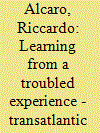

|
|
|
|
|
| Publication |
2011.
|
| Summary/Abstract |
With the US eventually embracing the European-devised 'dual track' approach comprising both sanctions and incentives, the transatlantic partners have currently reached a remarkable level of convergence on how to deal with the Iranian nuclear conundrum. Although EU--US unity might not be enough to solve the dispute, the experience of transatlantic cooperation on Iran offers some important lessons. It shows that strategic convergence between the transatlantic partners, or lack thereof, has a considerable impact on the way a crisis unfolds in an area in which both parties have a stake. It highlights the added value represented by European/EU political and economic assets in a situation in which US military options are both unlikely to have the desired effect and at grave risk of backlash. Finally, it sets an important precedent for a specific option for intra-EU and EU--US cooperation - the contact or lead group - that seems to suit the emerging multipolar world better than other, more institutionalised methods.
|
|
|
|
|
|
|
|
|
|
|
|
|
|
|
|
| 8 |
ID:
109187


|
|
|
|
|
| Publication |
2011.
|
| Summary/Abstract |
Centrifugal forces are gaining strength year by year in inter-American relations. US policy toward neighbouring Latin America is today retreating from a long tradition of efforts to formulate a Latin American-wide policy. It is early to dismiss the prospect of a future resurgence of hemispheric cooperation. Surely the US and Latin America share enough common interests and values for cooperation, even integration to benefit all countries. But the trend is now toward a Latin America increasingly independent of the US. The United States is becoming more and more focused on its own problems, while increasingly middle class, globalised Latin American nations are finding new partners, and determinedly pursuing their own course.
|
|
|
|
|
|
|
|
|
|
|
|
|
|
|
|
|
|
|
|
|